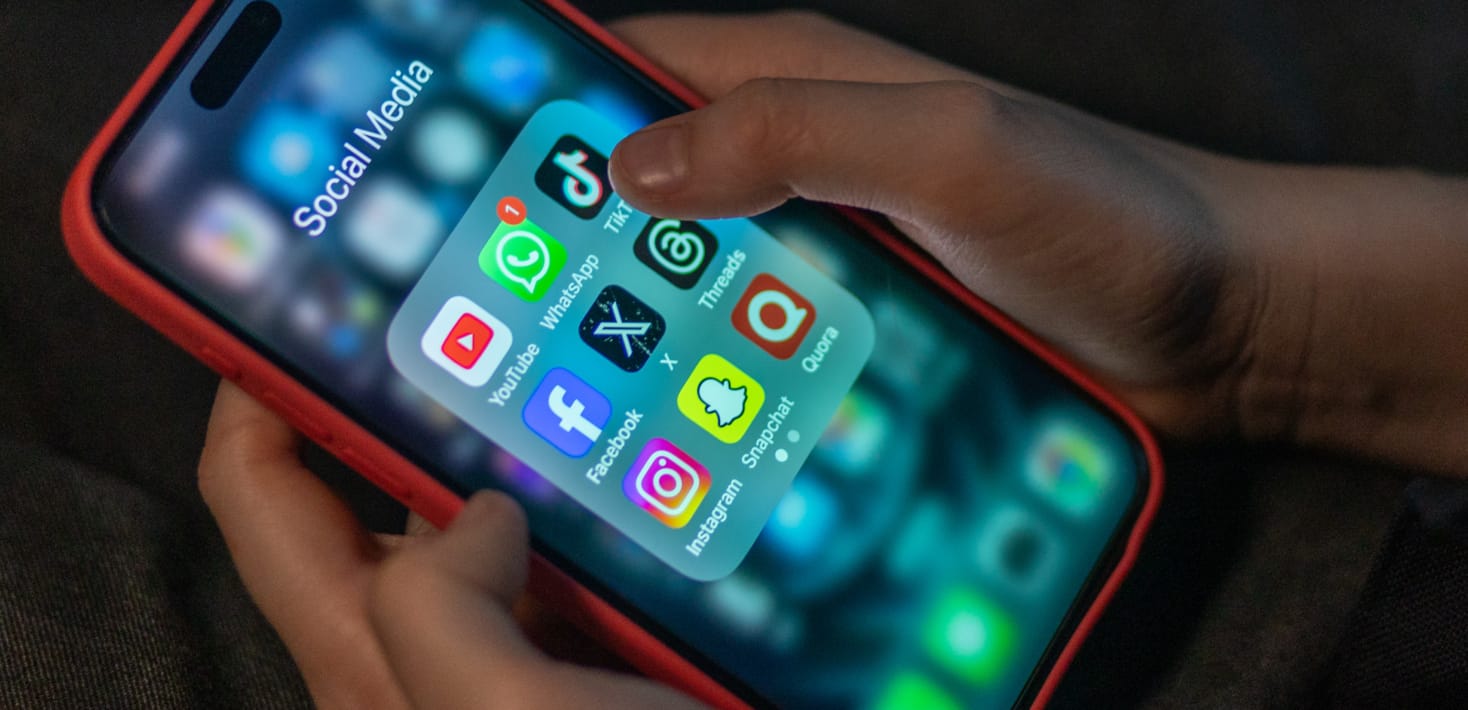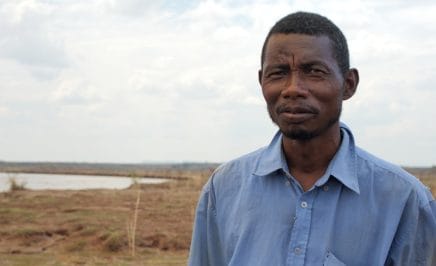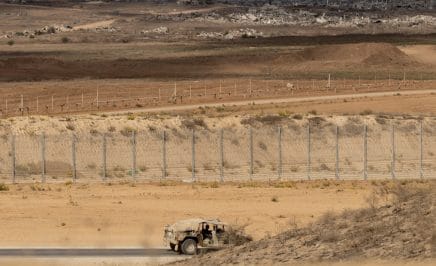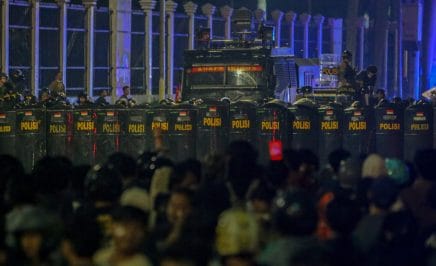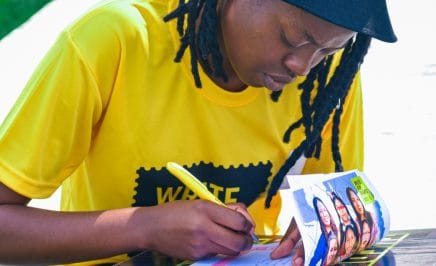Update
Across Australia, young people under 16 will be banned from social media after the Government passed the Online Safety Amendment (Social Media Minimum Age) Bill 2024 on November 28, 2024.
The ban will take effect in 12 months’ time, allowing social media companies time to comply with the new laws. Under these laws, social media platforms must take ‘reasonable steps’ to ban users under 16.
Here’s what the Government should do now to protect human rights:
- Work with young people to implement the ban.
- Ensure age verification measures do not violate rights to privacy.
- Legislate a duty of ware requiring social media platforms to protect people from harm.
- Protect the rights of children and everyone’s right to privacy with a Human Rights Act.
What is the social media ban?
In September 2024, Australian Prime Minister Anthony Albanese announced plans to introduce laws banning children under 16 from social media. On November 21, a Bill requiring social media platforms to take ‘reasonable steps’ to ban users under 16 was introduced to Parliament. The Bill passed the House of Representatives this week.
The Bill’s objective is to protect children and young people from the harmful impacts of social media, which is consistent with Australia’s obligations under the Convention of the Rights of the Child (CROC).
However, the Bill doesn’t acknowledge that social media also provides young people benefits such as inclusion, social connection and belonging that are protective of mental health.
If the Bill passes, social media companies may require all users in Australia to verify their age using biometrics. Age verification technologies are in their infancy, and relying on companies with a history of abusing people’s right to privacy to use these untested technologies risks the abuse of people’s right to privacy.
In recent years, Amnesty International has documented the harmful impacts of social media on human rights, particularly on the human rights of children and young people. However, a ban that isolates young people will not meet the government’s objective of improving young people’s lives.
Amnesty International Australia has made a submission to the inquiry into the Online Safety Amendment (Social Media Minimum Age) Bill 2024.
Amnesty International calls on the inquiry to recommend:
- The Online Safety Amendment (Social Media Minimum Age) Bill 2024 not be passed,
- The government implements regulations for social media platforms to ensure the safety of children online and protect the right to privacy, and
- The government legislates a Human Rights Act, ensuring the protection of all human rights in Australia’s federal laws.
What does this Bill mean for human rights?
Social media provides young people benefits such as allowing young people to connect, to learn, to express themselves, and to hold the powerful to account.
It is for these reasons that so many LGBTQIA+ young people have expressed their concerns with the Bill. A ban that furthers isolation, and obliterates connections and community, will not meet the government’s objectives of improving young people’s lives.
A study led by the Australian National University (ANU), looking at the impact of regular use of social media platforms on life satisfaction levels for Year 10 and 11 students across the country, reported that levels of life satisfaction were negatively impacted by those who regularly used social media.
However, the study also found that young non-binary people who regularly use platforms like Twitter (now X), reported higher levels of life satisfaction, compared to the general population.
Removing access to platforms that enable social connection for young people does not address the core issue that social media companies profit from harmful content, addictive algorithms, and surveillance.
Governments must acknowledge that social media also allows young people to realise their human rights;
- To freedom of expression, and
- To freedom of peaceful assembly and association.
The Bill also risks impacting everyone in Australia’s human rights to privacy through age verification technologies that are untested and unproven and put data in the hands of social media companies.
Not old enough to be online but old enough to do time
While the Australian Government moves to introduce this social media ban for all young people under the age of 16, children as young as 10 are being incarcerated without conviction.
The age of criminal responsibility is the age at which a child is considered by law to have understood that their actions were wrong and can face criminal charges. This age is currently set at only 10 years old across all states in Australia – except for the ACT where they passed legislation in November 2023 to raise the age to 14 on 1 July 2024, with a transition period raising the age to 12 until then, and Victoria, where the age is currently set at 12 years.
Australia has one of the lowest ages of criminal responsibility in the world, with the global average being 14 years. We have been repeatedly criticised by the United Nations for failing to reform the current minimum age.
Should the Online Safety Amendment (Social Media Minimum Age) Bill pass, a 13-year-old – typically in Years 7 or 8 – in most states across Australia could be arrested, held in police cells, hauled before the courts and locked up behind bars, and yet they would not be old enough to legally use Facebook, Instagram, TikTok or X.
What are we calling for?
Rather than banning children and young people from social media, we are calling on the Albanese government to prioritise the human rights of young people by regulating social media platforms so that children and young people can be safe online while protecting everyone’s right to privacy.
Amnesty International Australia’s campaigner Nikita White, said:
“Children and young people can experience significant harm from social media, but so too can adults. The government should prioritise forcing social media companies to remove harmful content from their sites, including graphic content and hate speech, and providing users better control over platform algorithms.”
Amnesty International calls for:
- The Online Safety Amendment (Social Media Minimum Age) Bill 2024 not be passed,
- The government regulates social media platforms to ensure the safety of children online and protect the right to privacy, and
- The government legislates a Human Rights Act, ensuring the protection of all human rights in Australia’s federal laws.
The good news is that we’re closer than ever to protecting our human rights in law. The Labor-led Parliamentary Joint Committee on Human Rights has recommended the government legislate a Human Rights Act to protect all our human rights in our federal laws.
Now, we need the Albanese Government to agree to the inquiry recommendation and commit to legislating a Human Rights Act. Sign the petition to support a Human Rights Act now. Together, we can create a fairer future, where all our human rights are protected in our federal laws.
Support a Human Rights Act by sharing your story
Without a Human Rights Act protecting human rights in law, there’s not much people can do to hold those responsible for human rights abuses to account. Because of this, powerful people continue to abuse human rights.
We want to hear from you
You can help change this by sharing a story of why you want the Albanese government to protect your human rights in law.
- Have you experienced human rights abuses? Has someone you care about or your community?
- Why do you support legislating a Human Rights Act?
Stories are a powerful way to show Members of Parliament that people all around Australia need and want their human rights protected in a Human Rights Act. Stories can be shared anonymously and will only ever be shared with your consent.
Amnesty International is a global movement of more than 10 million people who take injustice personally. We are campaigning for a world where human rights are enjoyed by all – and we can only do it with your support.
Act now or learn more about a Human Rights Act.
